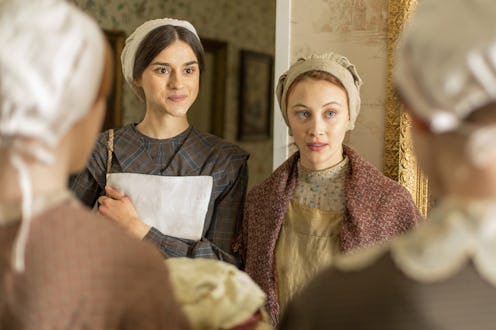Entertainment
'Alias Grace' Made A Real Murder Story Even Creepier By Giving The Protagonist A Friend

Margaret Atwood is having quite the year. After the renowned author's book The Handmaid's Tale was adapted into a Hulu television series, reaching larger audiences and winning plenty of awards, yet another adaptation of an Atwood novel is making waves. Alias Grace, a Netflix miniseries based on her novel of the same name, is part murder mystery, part character study, and full of interesting characters. But since it's historical fiction, some of them are real (like Grace Marks) and others are invented for the purposes of telling an even more exciting story. So, though Mary Whitney from Alias Grace isn't a real person, her addition to the tale will chill you to the bone.
The book Alias Grace goes as such — in 1843, Thomas Kinnear and Nancy Montgomery, his housekeeper and alleged mistress, were murdered. Two servants of the household, Grace Marks and James McDermott, were convicted of the crime, and while McDermott was hanged for it, Marks was sentenced to life in prison. That's all true. Here's where the fiction steps in, though. Some time later, a (fictional) psychologist, Simon Jordan, is researching the case and trying to assess Grace’s criminal behavior — is she "crazy," smart, or stupid? And, most importantly, is she actually capable of committing the double murder of which she’s been convicted? It’s a tale that shows that looks can be deceiving, and the fact that it’s historical fiction only amps up the intrigue.
Book spoilers (and thus series ones) follow, so proceed with caution.
In the book and in the show, Grace meets fellow maid Mary Whitney and the two become fast friends. Mary teaches Grace how to act as a servant, and they’re best buds… until Mary gets pregnant by a son of the family she works for and dies after getting an abortion. Because, as Grace says, the window wasn’t open and Mary’s soul couldn’t escape, it instead goes into Grace's body, merging Mary's spirit with Grace. In the end of the series (spoilers), Grace is hypnotized to reveal the truth behind the murders. In a terrifying voice unlike her own, Mary seemingly reveals that she compelled Grace to commit the murders after hiding out in Grace's body since her own death. (Readers debate whether or not Grace was lying, though.) In any case, this is obviously the fictional part of the historical fiction, because traditional historical stories — biographies and the like — don’t talk about souls floating from one body to another.
And, while Grace was a real person and this murder case actually happened, there's no evidence to be found that anyone named Mary Whitney actually lived as it relates here. From the book, it seems that Atwood’s speculation is that Grace used a friend’s name to escape her past, but there's no concrete, definitive evidence of that. In the book, Grace is eventually pardoned (as she was in real life) and then leaves for the United States, and she may have used Mary Whitney as her name in her new life. It’s all very complicated.
And it’s meant to be so. Of the work, Atwood said at TIFF that it’s impossible to know if Grace is telling the truth — or even what the truth is — because no one is a perfect narrator. “I don’t think anyone is a reliable narrator — in real life or anywhere else,” Atwood said. “Who tells the absolute truth all the time?” That, she said, is partially why she was drawn to tell the story in the first place.
“There were so many different, contradictory stories about Grace Marks; nobody actually ever knew whether she had killed anybody or not. There were four people in the house. Two of them were murdered, the third one was hanged and she was the one left. And she never told. If I had known the truth, I probably wouldn’t have written a book. And if I had known the truth and told it to Sarah [Polley], she probably wouldn’t have made this show. The interesting thing is the way everybody projects their ideas onto Grace. The fact that she had various stories that she told to different audiences… well, that always affects the story that you tell — who the audience is. Does it not?”
And that’s the thing about telling the truth — everyone has their own version. It’s clear in Alias Grace, and it’s clear in the mystery of Mary Whitney and how she fits into Grace's life in the book and in reality.
Check out Bustle's spooky 'What's Up, Boo?' series and other videos on Facebook and the Bustle app across Apple TV, Roku, and Amazon Fire TV.